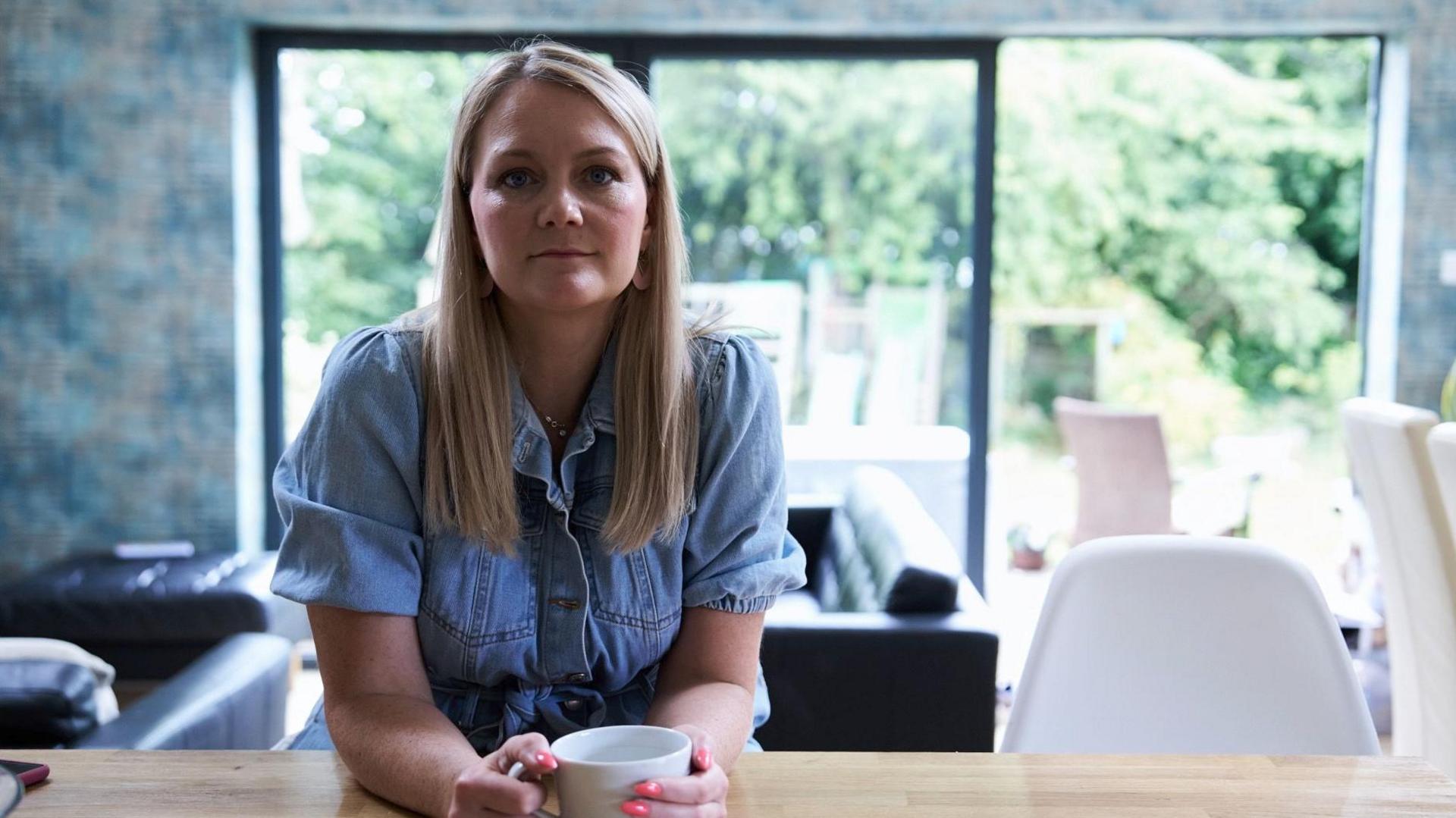'People don’t talk about breastfeeding grief’

Jemma Munford says she wanted to breastfeed "more than anything"
- Published
For decades, many new mothers have heard the message “breast is best”.
It's meant to encourage breastfeeding, but it can also create immense pressure for those who struggle with the practicalities.
Some women are desperate to breastfeed but are forced, for various reasons, to stop earlier than planned.
A number of them spoke to the BBC to discuss "breastfeeding grief" - a period of immense sadness, and even shame, following their decision to stop.
Jemma Munford, who gave birth to her son Max in 2017, had planned to exclusively breastfeed. By the third day, however, she was finding it hard.
“I was sitting on the sofa, holding my baby, and I couldn’t stop crying,” she recalls.

Jemma says she's still traumatised that her choice to breastfeed was taken away from her
She describes the next two weeks as “hell” and says she dreaded every feed. Her son had a tongue-tie, a condition where the strip of skin connecting the tongue to the mouth is tighter than usual, making it almost impossible for him to latch on to her breast.
At her lowest point Jemma asked visitors to leave her house as she hid in her bedroom with the curtains closed, trying desperately to get her baby to latch.
“I found the experience of breastfeeding exhausting and embarrassing,” she adds.
After a couple of weeks, her baby started losing weight. Faced with the possibility of returning to the hospital, she decided to switch to feeding him exclusively with formula milk.
Her second child was born two years later - and even though her newborn daughter didn't suffer from a tongue-tie she decided early on that she “couldn’t face” attempting to breastfeed longer than a couple of days.
She still grapples with the decision today. “I wasn’t able to do the most natural and unique thing a mother can do, and I felt ashamed - I still do,” she says.
She believes she may have been suffering from postnatal depression, though it wasn’t diagnosed at the time.
What is 'breastfeeding grief'?
Professor Amy Brown, a public health researcher who has written a book on breastfeeding grief, explains that feelings of sadness about breastfeeding experiences are common.
“Many women stop breastfeeding much earlier than they wanted to and feel let down or that they missed out on an experience,” she says.
Research shows that many women still want to breastfeed, external. In the UK, 81% of women initiate exclusive breastfeeding, but after six months, only about 1% are still exclusively feeding their babies breast milk.
Currently, the World Health Organisation (WHO) recommends exclusive breastfeeding, external for the first six months of life, while UNICEF, external notes that breastfeeding reduces the risk of sudden infant death syndrome (SIDS), childhood diabetes, heart disease, and obesity.
Globally, the percentage of infants under six months exclusively breastfed has reached 48%, a 10% increase on the last decade.

Deepti: "I can’t describe how much I wanted to breastfeed, I was upset a lot of the time"
Deepti, who is seven months pregnant with her second child, hopes her breastfeeding journey will be better than her previous one.
She gave birth to her son in 2021 and struggled with getting him to latch due to a tongue-tie. Even after the condition was corrected, she continued to have issues.
Deepti decided to express her milk and feed him with a bottle, but found the routine to be impractical and "relentless".
“It was every two hours, including during the night and I felt like a failure - like I was doing a bad job,” she says.
The feeding schedule kept her from getting out of the house almost entirely. By the time her son was 12 weeks old, she had switched to formula so she could enjoy time with him outside and attend baby classes, which she felt were important for his development.
A month later, Deepti learned the tongue-tie procedure had been done wrong and needed more treatment due to scar tissue - but by then, it was too late to return to breastfeeding.
Deepti felt a sense of shame and “mum guilt” when using a bottle among her breastfeeding friends. “No one ever judged me, but I felt ashamed I was bottle-feeding and sad that I couldn’t breastfeed like them,” she says.
Why do women stop?

While her baby son could sleep through the night at eight weeks, Deepti was still getting up twice to pump breastmilk
While Jemma and Deepti’s babies both had a tongue-tie, there are several reasons why a mother can struggle to breastfeed. Sore, cracked or bleeding nipples due to latching issues, and low or high milk supply are common problems.
Engorgement - when breasts can become overly full with milk - can in some cases lead to mastitis, an infection caused by a blocked milk duct resulting in soreness and pain when breastfeeding.
Lisa Mandell from the International Lactation Consultant Association provides counselling and advice to women experiencing issues with breastfeeding. She says it’s vital that women get expert lactation advice and breastfeeding support as early as possible.
“There may be multifaceted issues, for example if a mother with low milk production has thyroid issues then that can be identified and treated, it is likely to improve her milk production,” she says.
She points out that breastfeeding “should never be painful” and is a sign that a baby is not positioned or attached well.
“Breastfeeding cessation should never be considered a failure on the part of the mother," she adds.
Clare Murphy, director of Feed UK, says that infant feeding isn’t straightforward and that we should be focussing on supporting women, however they choose to feed their baby.
"No one - least of all mothers and their babies - benefit from an environment in which women feel guilty and their mental health suffers because they have needed to use formula when they hoped to avoid it,” she says.
Deepti plans to attempt breastfeeding again but says she won’t put herself under the same pressure next time. “I will 100% try again and I feel much more equipped now as I’ve already been through it once."
Jemma’s son Max is seven now but she says she still gets upset. She tearfully admits she has “a deep and overwhelming regret that breastfeeding didn’t work out” - but hopes that there is now more awareness in supporting all women, regardless of their feeding choices.
What to do if you are struggling with breastfeeding:
The NHS, external has a useful guide and advice on common breastfeeding issues such as sore nipples, latching and positioning and high or low milk supply.
Video tutorials and other resources can be found on the UNICEF website
Feed UK supports all forms of feeding, whether it’s breast, formula or a combination.
Related topics
Weekend reads
- Published11 August 2024

- Published11 August 2024

- Published11 August 2024

- Published11 August 2024

- Published11 August 2024
